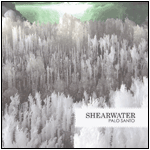|
|
 |
Dusted Reviews
Artist: Shearwater Album: Palo Santo Label: Misra Review date: Apr. 23, 2006 |

|
|
|
 |
The initial strains of "La Dame et la Licorne" pit Jonathan Meiburg's high, flickering voice against a backdrop of near total silence, broken only by occasional piano chords. It's a fitting start for an album whose focus is one extraordinary tenor voice – capable of trembling murmurs and enraged wails, vibrato trills and ghostly moans – and set always in an enveloping, billowing space. The opening cut will remind you, tantalizingly, with an almost physical ache, of Talk Talk's Spirit of Eden, in its minimalist drama, the way it captures pure unfiltered longing and encases it in clean swathes of silence. There are musical accents, soft queries in piano, dissonant scrapings of Howard Draper's violin, yet mostly it is that voice, operatic even at the softest volumes, finding the junctures between emotive expression and silence.
This fourth full-length from Austin-based Shearwater represents a giant step forward from the already excellent Winged Life. Meiburg writes all the songs this time, his exercises in mood and texture no longer counterbalanced by former partner Will Sheff's narrative-based compositions. Not all the songs are as impressionistic, or as loosely structured as "La Dame et la Licorne." Both "Red Sea, Black Sea" and "Seventy-Four, Seventy-Five" are driven forward by frantic eighth-note keyboard pounding, and "White Waves" lays a scratchy indie-rock guitar riff under Meiburg's vocal flourishes. Still, there's a nonlinearity even in the more conventional song structures that makes Palo Santo a visceral, rather than intellectual, enterprise. You leave the album not sure what any of its songs are about, but transfixed by a sense of longing, resignation, struggle and occasional triumph.
The most ephemerally gorgeous of these songs is the title cut, a spidery tracery of folk guitar picking and whispery lullaby melody. The instrumentals are subtle, a shimmer of electric keyboards, a murmur of cello, a tangling web of guitar notes, all quietly, mournfully supporting. The focus though is on the singing, which flutes and flutters and takes sudden Antony-ish flights into the high register without audible breath or effort. Just as good, though more rock oriented, is the cut that follows, the pounding, propulsive "Seventy-Four, Seventy-Five." Here the backing band turns prickly and staccato, pushing ahead one of the disc's most anthemic choruses. The song seems to be about aging, sort of a rage-against-the-dying-of-the-light idea, but the lyrics are so abstract as to defy explication. Still, there's no way to miss the defiance in the song, as Meiburg makes one of his epic swoops over a ratcheting rock background.
The singing is so arresting here, that it becomes hard to concentrate on what's being said. Yet the lyrics, where they pop out of the texture of songs as in "Johnny Viola," hint at a transcendental link between music and the material world. "If you could ring the sky like a bell / Even such a sound could never suffice / If you could bang the world like a drum / It would only show that it's hollow inside," goes the opening stanza, a set of phrases that becomes more puzzling the longer you think about them.
These are wonderful, lilting songs that resist your every attempt at nailing them down. The content, maybe, is nothing more than it seems, an effortless voice floating over feather-light textures of guitar, drums and stringed instruments, landing lightly as a butterfly and moving on. The songs are beautiful things: hard to catch hold of, but worth admiring just the same.
By Jennifer Kelly
|







